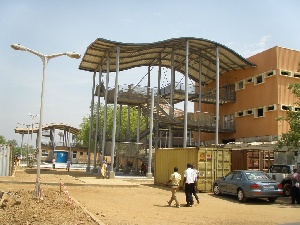- Home - News
- Elections 2024
- News Archive
- Crime & Punishment
- Politics
- Regional
- Editorial
- Health
- Ghanaians Abroad
- Tabloid
- Africa
- Religion
- Photo Archives
- Press Release
General News of Wednesday, 23 April 2025
Source: www.ghanawebbers.com
The Tamale Teaching Hospital crisis – "RESET" but don’t "DELETE"
The Tamale Teaching Hospital (TTH) is once again in the spotlight.
The CEO has been dismissed, causing a public uproar. The Minister of Health made this decision, which many see as overdue accountability.
However, this raises an important question: Haven’t we seen this before? Why does little change after such events?
Sacking another CEO is not a solution. It’s merely a temporary fix to calm public anger. Meanwhile, deeper issues within the healthcare system remain unaddressed.
This cycle repeats itself: scandals arise, blame is assigned, and the CEO takes the fall. Inefficiency persists, patients continue to suffer, and the pattern starts anew.
There are often “good reasons” for actions taken and then there’s "the real reason." The CEO's removal may quell immediate concerns but doesn’t address systemic failures at TTH.
TTH was designed as a tertiary facility for specialized care. Yet it now serves as the first point of contact for all health issues—from malaria to maternity.
Why is this happening? Other healthcare facilities in Tamale are failing or non-existent.
The so-called “Central Hospital” should be a regional referral hub but is under-equipped and overwhelmed. Some rural district hospitals perform better than it does. Health centres and polyclinics are barely functional or missing altogether.
As a result, TTH struggles with cases it shouldn’t handle, draining resources meant for critical care.
Adding to these challenges are political and tribal interferences. Management at TTH has faced disruptions from political operatives and vigilante groups.
A former CEO was chased out by local thugs with alleged support from chiefs. Another left due to mysterious pressures without any inquiries or accountability.
Appointments often rely on loyalty networks rather than merit—tribe, politics, or personal connections take precedence over competence. This practice harms TTH and undermines the entire healthcare system.
Let’s also discuss health workers’ roles in this situation. While we seek accountability from leadership, some healthcare professionals lack ethics and humanity.
Rudeness and neglect have led to complications for patients that must change too. However, we must also recognize dedicated professionals who work tirelessly under difficult conditions.
These unsung heroes uphold high ethical standards despite systemic challenges at TTH. They remind us of what can still be achieved in healthcare.
If we truly want to "reset" TTH, let’s make it meaningful—not just symbolic or political. We need to ask crucial questions:
Why doesn’t Tamale have a well-resourced regional hospital?
Where is the plan to strengthen primary and secondary healthcare?
Why do we accept tribalism over professionalism?
When will leaders collaborate to create an effective decentralized healthcare system?
We need a thorough audit of health services across northern Ghana—not just at TTH. Appointments should be based on qualifications; leadership must be free from political interference; integrity should be prioritized over loyalty.
As we aim to fix what’s broken, let’s not destroy what works well at TTH. Its doctors and nurses rise above dysfunction—they deserve protection and support.
We shouldn’t confuse the need for reform with calls for destruction. In rebuilding TTH, we must avoid pressing the delete button on its vital components.
This issue extends beyond one hospital; it reflects a broader health system needing structural changes and moral improvements. It’s time to shift from reactive politics to proactive building efforts for Tamale's future healthcare needs.











